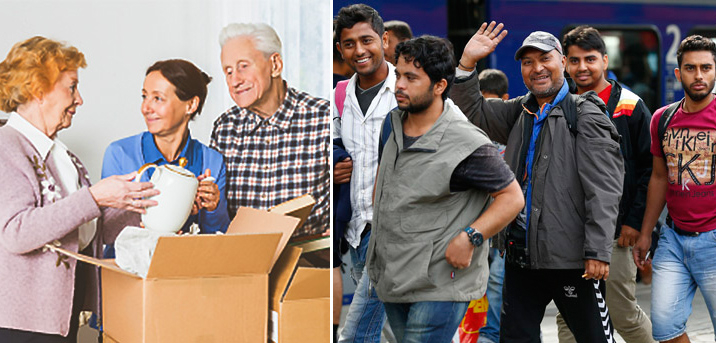“I fear we are approaching a situation resembling the tragic fate of Christianity in Northern Africa in Islam’s early days”, a Lutheran bishop, Jobst Schoene, warned a few years ago.
In ancient times, Algeria and Tunisia, entirely Christian, gave us great thinkers such as Tertullian and Augustine. Two centuries later, Christianity has disappeared, replaced by Arab-Islamic civilization.
Is Europe now meeting the same fate?
In the Middle East, “Christianity is over in Iraq” due to Islamic extremism; in Europe, Christianity is committing suicide.
Within 20 years, more babies will be born to Muslim women than to Christian women world-wide; it is just the latest sign of the rapid growth that seems to be making Islam the world’s largest religion by the end of the century, according to a new study released by the Pew Research Center.
“Christianity is literally dying in Europe,” said Conrad Hackett, the head of the researchers who worked on the Pew report.
According to it, between 2010 and 2015, the Muslim population increased by more than 150 million people to 1.8 billion.
In Europe, how many Christians have been “lost”? Between 2010 and 2015, “deaths outnumbered births by nearly 6 million during this brief period”.
At this pace, Christianity will vanish in Europe.
In the same time frame, in most European countries — including Britain, Germany, Italy and Russia — Christian deaths outnumbered Christian births. “In Germany alone, for example, there were an estimated 1.4 million more Christian deaths than births between 2010 and 2015, a pattern that is expected to continue across much of Europe in the decades ahead”, Pew discovered. There are clear patterns of demographic trends, church attendance, closures of parishes and the declining number of priests.
These patterns are why Islamic leaders, such as Turkish President Recep Tayyip Erdogan, have been waging a demographic war against Europe. “Have not just three but five children”, Erdogan said to Muslims in the old continent. “You are the future of Europe”. This plan is called, in Islam, hijrah: expanding Islam by migration, based on Mohammad’s flight from Mecca to Medina in 622.
Christianity in Northern Europe has already been weakened by atheism, a trend possibly accelerated by modern gains in science and medicine. The American sociologist Phil Zuckerman, after spending more than a year in Scandinavia, published a book, Society Without God. Recently, after a nationwide advertising campaign by the Atheist Society thousands of people left the Church of Denmark. Norway’s state church lost more than 25,000 members in a month. Last year, more than 90,000 people chose to drop out of the Church of Sweden — almost twice as many as the year before. Meanwhile, in one year, 163,000 migrants, most of them Muslim, entered the country.
Christianity is also collapsing in the UK. Across Greater Manchester, 20 churches will soon close. According to some reports, Anglicanism will disappear from Britain by 2033. The Catholic Church’s Archdiocese of St Andrews and Edinburgh is planning to cut the number of parishes from more than 100 to 30. The Archdiocese of Glasgow, by far the country’s largest, will soon — within two decades — have only 45 priests and probably shut down half its parishes. Imagine, a huge Catholic community will close half its churches.

The Catholic Archdiocese of St Andrews and Edinburgh, headed by Archbishop Leo Cushley (right), is planning to cut the number of parishes from more than 100 to 30. (Image source: Lawrence OP/Flickr) |
Catholics in the Netherlands are also embracing a “future without churches“. Cardinal Willem Eijk, Archbishop of Utrecht, announced that by 2025 about a thousand Catholic parishes would close. “We predict that a third of Catholic churches will be closed by 2020 and two-thirds by 2025”, he said.
Most churches in Brussels will be also closed– 108 of them. Vienna Archdiocese in Austria will also liquidate most of its parishes — 660 of them — in the next 10 years. Instead, the Archdiocese will merge them into 150 larger parishes.
One finds similar numbers everywhere in Europe, from Catholic Spain to the Protestant United Kingdom.
Father Benedict Kiely, a Catholic priest who founded nasarean.org, which helps persecuted Christians in the Middle East, recently met some Christians persecuted by ISIS in Iraq. As he left the country, another elderly priest, himself a refugee, gripped Kiely’s hand and told him in Arabic: “Be careful, be very careful. What has happened here will come to you”.
As the attacks against two Coptic Christian churches in Egypt on Palm Sunday reminds us, the war of extermination being waged against Christians in the Middle East is very real indeed.
Canadian philosopher Mathieu Bock-Côté writes in Le Figaro:
“The Western world has long gotten used to the persecution of Christians in the Middle East, as if their bad lot is inevitable and has to simply be accepted. Shouldn’t the issue of Middle Eastern Christians wake up European civilization to its core identity? Shouldn’t we in Europe and the West be telling ourselves that these attacks are also aimed at us?”
Europe has, for some time, been experiencing this war against Christianity on its own soil: the terror attack at a French church in Normandy, in which Islamic extremists murdered a priest before the altar; the terror plot against the Cathedral of Notre Dame; the threat by ISIS to turn Saint Peter’s Cathedral into a mosque; the deadly terror attack at a Christmas market in Berlin, to name just a few of them.
“The mother tongue of Europe is Christianity”, said the great German writer Johann Wolfgang von Goethe — not a Pope. Maybe that language will again be strong in the future. Maybe priests will keep Christianity alive in London, Brussels and Paris. Maybe. But that is not what happened in North Africa.
By now, Goethe’s “mother tongue” has, in Europe, been reduced to a barely-discernible whisper. Instead, one can hear, instead, the “Islamic tongue” getting stronger every year.
Giulio Meotti, Cultural Editor for Il Foglio, is an Italian journalist and author.

































